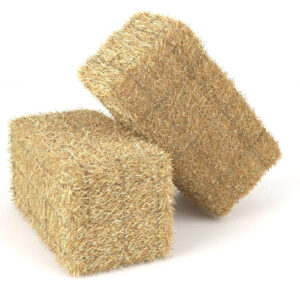
We are a leading supplier of Animal Feed – Wheat straw (Bhoosa) in Karachi, Pakistan. With a name of “Saith Gulzar Ali & Sons”. We are importing Wheat Straw (Bhoosa) in Karachi from different cities and villages of Pakistan like Dadu, Jhat Pat, Mirpur Khas, Jhudu, Koat Ghulam Muhammad, James Abad, Moro, Nawabshah, Sadiqabad, Okara etc. Our straw is best quality, specialized for high quality cattle feeding. We can cater your needs for animal fodder. We import animal food in Karachi from the areas of Pakistan which is renowned for producing the country’s best quality wheat, cotton, orchids and other crops.
We collect fodder directly from Sindh and Punjab farmers, than chop and compressed balling to save transportation cost. You can contact us for the newly crop for stocks in your farms.
We are offering Wheat Straw also in bundles to our customers. We have a market of wheat straw called Bhoosa Mandi, where we sell our loaded trucks on commission. It is situated at Road # 8 Cattle Colony near Slaughter House of K M C. 200 loaded vehicles are arrive daily in Bhoosa Mandi.
Straw is an agricultural by product consisting of the dry stalks of cereal plants after the grain and chaff have been removed. It makes up about half of the yield of cereal crops such as barley, oats, rice, rye and wheat. It has a number of different uses, including fuel, livestock bedding and fodder, thatching and basket making.
Straw is usually gathered and stored in a straw bale, which is a bale, or bundle, of straw tightly bound with twine or wire. Straw bales may be square, rectangular, or round, and can be very large, depending on the type of baler used.
Hundreds of different fibrous plants can be manufactured into alternatives to tree-based paper products, most notably wheat, rice, hemp, flax, and sugar cane. In many agricultural processes, straw is treated merely as the agricultural waste that remains after grain or juice is extracted from crops. Straw is a valuable resource that can be fashioned into disposable products like plates, take out containers, bowls etc.
Benefits of Wheat Straw Food Service Products
- Sturdy and strong
- Microwave and freezer safe
- Handle hot liquids up to 200 Fahrenheit
- Conform to US Food & Drug Administration guidelines
- Non-allergenic and gluten-free
- Fully compostable through home and commercial composting (composts completely in commercial facilities in 1-2 months)
- Fully compostable at home within 6 months (though not certified for home composing)
Animal feed
Straw may be fed as part of the roughage component of the diet to cattle or horses that are on a near maintenance level of energy requirement. It has a low digestible energy and nutrient content (as opposed to hay, which is much more nutritious). The heat generated when microorganisms in a herbivores gut digest straw can be useful in maintaining body temperature in cold climates. Due to the risk of impaction and its poor nutrient profile, it should always be restricted to part of the diet. It may be fed as it is, or chopped into short lengths, known as chaff.
Quantity of Wheat Straw required for the Animals under Different Circumstances
Feed 4-5 kilogram fodder daily to pregnant and lactating animals, and even to those which are non lactating animals. Use the straw by mixing it with green fodder, so that nutritional requirements of the animals are fulfilled.
| Usage | Animal Feed, Cattle feed |
| Availability of Wheat Straw | Full year |
| Moisture of Wheat Straw | 9% or less |
| Protein value of Wheat Straw | 2.5 – 7% Minimum |
| No. of Bales per FCL | Approx. 750 bales (compressed) |
| Size of Bale(s) of Wheat Straw | 17 x 18 x 18 inches |
| Crude Protein | 4.2% |
| Fiber | 41.5 |
| Color | Golden & yellow |
| Packing | 130kg and as per customer request |

